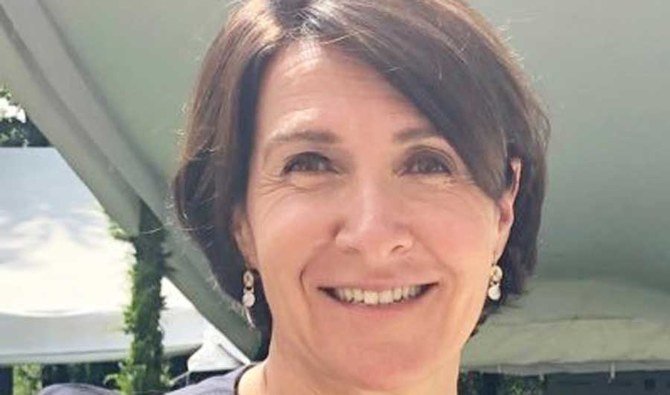
- ARAB NEWS
- 08 May 2024

Najia Houssari
BEIRUT: Anne Grillo, the French ambassador to Lebanon, on Tuesday said that the blame for the crisis in the country lies squarely with a succession of ruling authorities. She was responding to comments by caretaker Prime Minister Hassan Diab, who accused the international community of “punishing the Lebanese and turning its back on Lebanon, while pressuring and besieging the country.”
Grillo said: “The current situation in Lebanon is the result of mismanagement by the successive officials, who are still making mistakes; it is not the result of an external blockade.
“The world is already helping the Lebanese and not waiting for an invitation to a meeting to help them.”
Earlier in the day Diab called the ambassadors and other representatives of diplomatic missions and international organizations to a meeting at his Grand Serail offices and delivered a speech in which he called on “the world to save Lebanon.”
He said: “The severe crises experienced by the Lebanese people at various levels are pushing toward a major catastrophe whose repercussions cannot be contained. The Lebanese are facing a dark fate. The picture has become clear: Lebanon and the Lebanese are on the brink of a disaster.
“The danger that threatens the Lebanese will not be limited to them. When we hit rock bottom, the repercussions will resonate outside Lebanon’s geography. No one will be able to isolate themselves from the risk of Lebanon’s collapse.
“Lebanese stability is the basis for regional stability. With the presence of about 1.5 million Syrian refugees and hundreds of thousands of Palestinian refugees, it will be difficult to predict the consequences of Lebanon’s stability falling apart.”
Diab added: “Continuing to punish the Lebanese will inevitably lead to serious repercussions, as things will get out of control. Linking assistance for Lebanon to the formation of the government has become a threat to the lives of the Lebanese and the Lebanese entity. The pressures that are being exerted and the blockade imposed on Lebanon do not affect the corrupt; rather, the Lebanese people alone pay a heavy price that threatens their lives and their future.”
He said that neither his government, which resigned in August last year amid the outrage over the devastating explosion at Beirut’s port, nor any other government can save Lebanon from its predicament without the help of friendly countries and international institutions.
He added: “This government does not have the right to resume negotiations with the International Monetary Fund to implement the recovery plan set by the cabinet, for this entails obligations on the next government that it may not endorse. The absolute priority is thus to form a government. Staying trapped in this vicious cycle that has lasted for 11 months now is no longer acceptable.”
Diab’s speech was broadcast live on Lebanese TV but when Grillo began to respond, the coverage was cut off. The French envoy said the meeting was a little too late.
“The Lebanese crisis is the result of mismanagement that lasted for decades,” said Grillo. “Paris and its partners have been providing support to Lebanon for months without waiting for Diab to ask them to save Lebanon.
“The resigned government is able, even in a caretaker position, to negotiate with international financial institutions to address the dangerously deteriorating situation that Lebanon has reached.”
Several other ambassadors responded to Diab’s comments with similar strong words but the PM’s media office chose only to convey his speech and not the comments that followed.
The accusations in Diab’s speech were consistent with those in a speech by Hezbollah Secretary-General Hassan Nasrallah on Monday, in which he blamed the US “for the suffering of the Lebanese people.”
He said: “The main reason for the crisis is the US policy that wants to besiege, punish and prevent any aid that comes to Lebanon, be it in the form of deposits in the Central Bank or in the form of donations or loans … the US is the one preventing this.”
Meanwhile, the Lebanese people on Tuesday witnessed yet another fiasco involving state institutions amid the economic collapse. At noon, the members of two patrols from the state security got into a fistfight at a gas station in Furn El-Chebbak, an eastern suburb of Beirut.
A fuel shortage has caused clashes among people armed with sticks and knives, and even shootings at gas stations in several areas, especially in southern Lebanon and Bekaa.
All negotiations to form a new government have ground to a halt in light of the ongoing dispute between President Michel Aoun and Prime Minister-designate Saad Hariri.